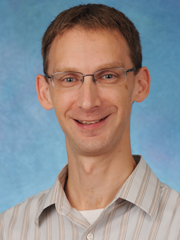The National Institutes of Health has awarded a research grant to the Division of Physical Therapy’s Michael Lewek in order to research the ability to predict someone’s likelihood of tripping while walking after having experienced a stroke. Lewek will conduct research alongside He “Helen” Huang, thanks to a partnership with the Department of Biomedical Engineering, a joint initiative between NC State University and UNC-Chapel Hill. The two-year research award, an R21, will allow for Lewek and his research team to better understand why people trip after a stroke when they’re walking, and the role clinicians can play in prevention.

According to Lewek, prior research has simulated tripping to determine how people respond. Although this work is critical for understanding balance recovery, it doesn’t help researchers figure out what causes a self-induced trip. Instead, Lewek’s research aims to predict in real time when a trip is most likely to occur in order to ultimately stop it before it happens.
“Imagine a computer watching you and saying with each step, ‘no trip, no trip, no trip, no trip, trip.’ We want to be able to predict that the trip is about to happen,” Lewek said.
Lewek, who has also received a faculty leave award from the Department of Allied Health Sciences in order to extend this research, hopes to develop an algorithm that will gauge the likelihood of tripping in real time. The algorithm could be applied in a device, such as an exoskeleton or electrical stimulator, which manipulates the leg to prevent the trip from occurring, such as by lifting your foot higher off the ground.
“From an efficiency standpoint, our goal is to swing our foot as close to the ground as possible without touching the ground,” Lewek said.
Lewek said he plans to analyze data from 15 or more people who have had a stroke in order to gather data indicative of both trip and non-trip steps.
“We’ll compare the trip steps to the non-trip steps to see what’s creating that outlier,” Lewek said.
During the study, participants will wear reflective markers and a harness and be asked to walk on a treadmill. Importantly, Lewek’s research focuses on the intrinsic factors that contribute to tripping—such as divided attention—as opposed to extrinsic factors, such as tripping on an object.
Lewek said results from this research could have implications for falls prevention and quality of life for individuals following stroke.
“Our goal is to prevent intrinsically driven trip-related falls,” Lewek said. “Falls are a big deal, especially in older adults. We’re trying to eliminate falls from happening.”
Currently, two Doctor of Physical Therapy students are working with Lewek in the interdisciplinary lab as part of their capstone projects, which will give them exposure to what’s driving evidence they’re using in a clinical setting. Lewek is recruiting both participants for his study and a PhD student to assist with research.
Michael Lewek, PT, PhD, is also the associate director of the Rehabilitation Engineering Center and an associate professor of physical therapy. The division is housed in the Department of Allied Health Sciences.